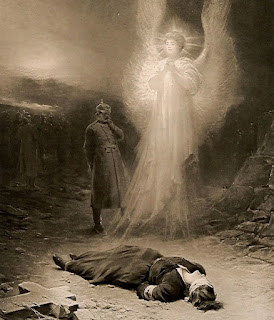THE TERRIBLE EXECUTION OF Edith Cavell: on October 12, 1915, British nurse Edith Cavell was executed in Brussels by German authorities for helping some 200 Allied POWs escape to the Netherlands, sparking international outcry.
Edith Louisa Cavell was born on December 4, 1865 into a religious and affluent English family near Norwich.
When her father contracted a serious illness she cared for him, leading her to become a nurse after his recovery.Cavell worked all over England before being recruited to train other nurses in Brussels, Belgium, in 1907.
In August 1914, Belgium was invaded by Germany, who occupied their capital Brussels on August 20, and Cavell's hospital was taken over by the Red Cross.
Beginning in November 1914, while tending to wounded soldiers of all nationalities, Cavell began assisting British, French and Belgian POWs with escaping to the neutral Netherlands.
As a British nurse in Brussels, some believe Cavell became a British Secret Intelligence Service agent, and was part of a network of people with the goal of helping Allied POWs escape the occupied Belgium.
Apart from overhearing and reporting German conversations at the hospital, Cavell sheltered Allied POWs and others and gave them money so they could reach the Dutch border.
In June 1915, a German agent infiltrated the network, leading to the arrest of Edith Cavell on August 3, 1915. Cavell admitted to helping 60 British, 15 French and over 100 French and Belgian men of military age to escape Belgium.
Cavell was put in prison for 10 weeks before being sentenced to death for war treason. The British government protested the sentence but could do nothing to save her.
At 7 AM on October 12, 1915, Edith Cavell was executed by a German firing squad and her body was buried next to her prison.
On the eve of her execution, Cavell is famously quoted: "Standing, as I do, in view of God and eternity, I realise that patriotism is not enough.I must have no hatred nor bitterness towards anyone.
In the months and years following Edith Cavell's execution, countless of newspaper articles of her story erupted worldwide.
Due to her honesty, novel cause, nurse profession and fearless approach to death she became a heroine in Britain, and her execution was represented as an act of German barbarism and dishonor.
The Allies used her execution for countless pieces of propaganda, which played a large role in recruiting thousands of British soldiers and gaining international British sympathy, particularly in the United States.
The British propaganda of her execution led to Edith Cavell becoming perhaps the single most impactful woman of the First World War and plentiful of memorials, films and music have featured her throughout the years.
Perhaps a less significant impact but still noteworthy, the female name Edith became increasingly popularized in France and Belgium, and the famous French singer Édith Piaf was named after Edith Cavell.





No comments:
Post a Comment